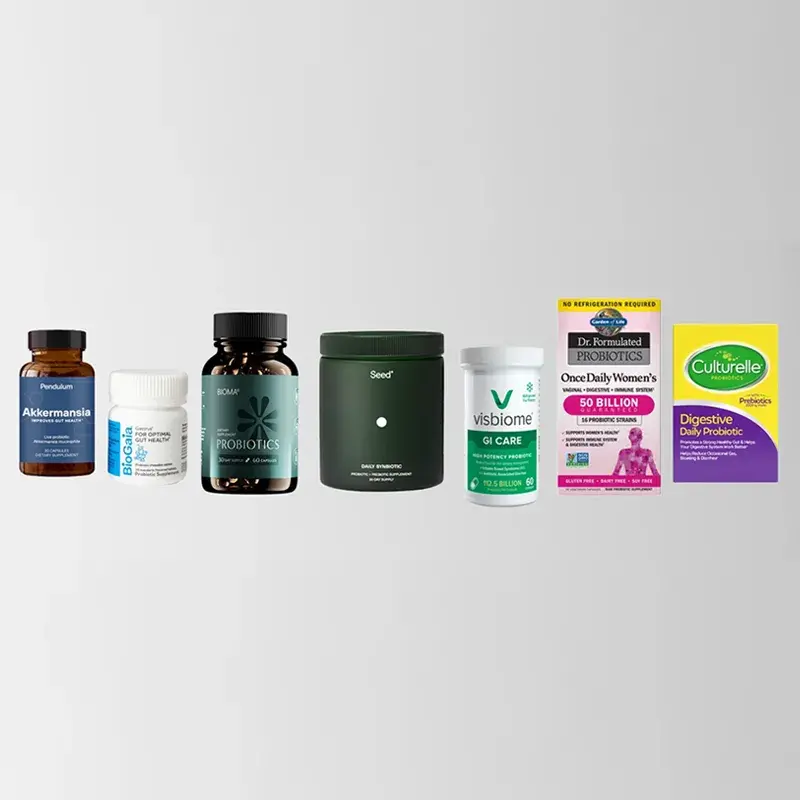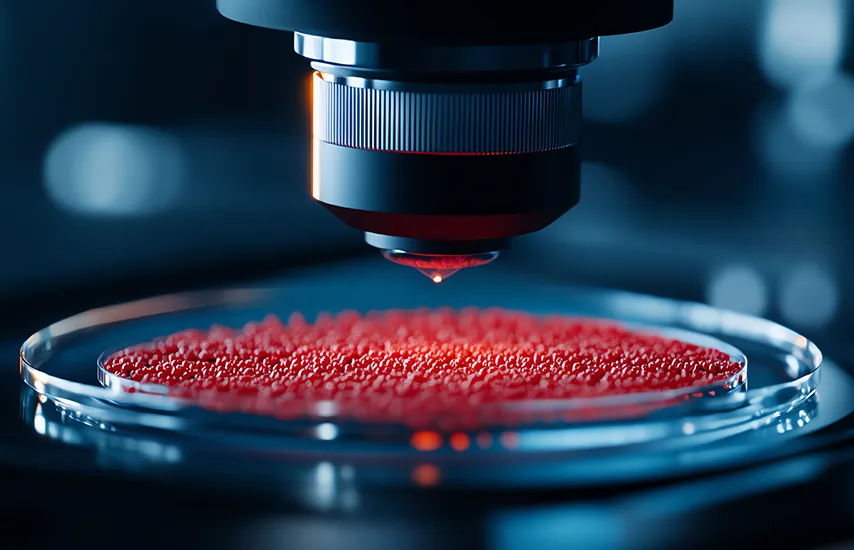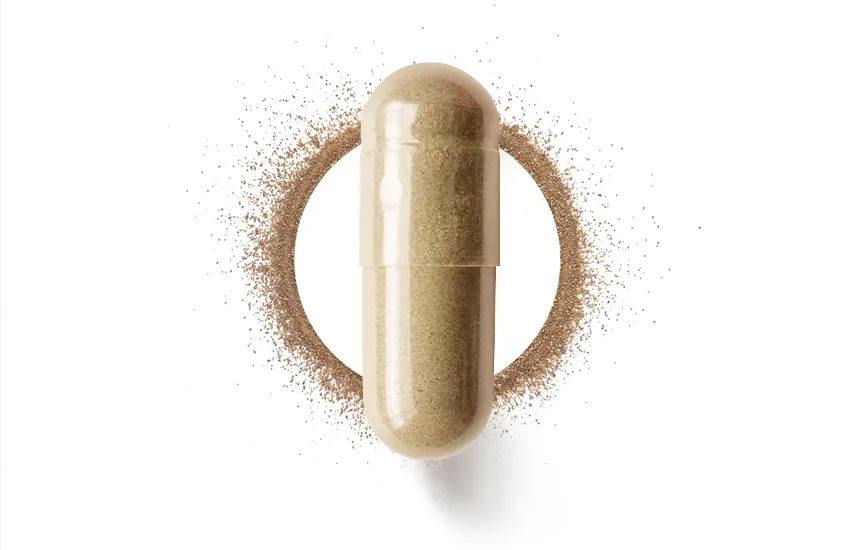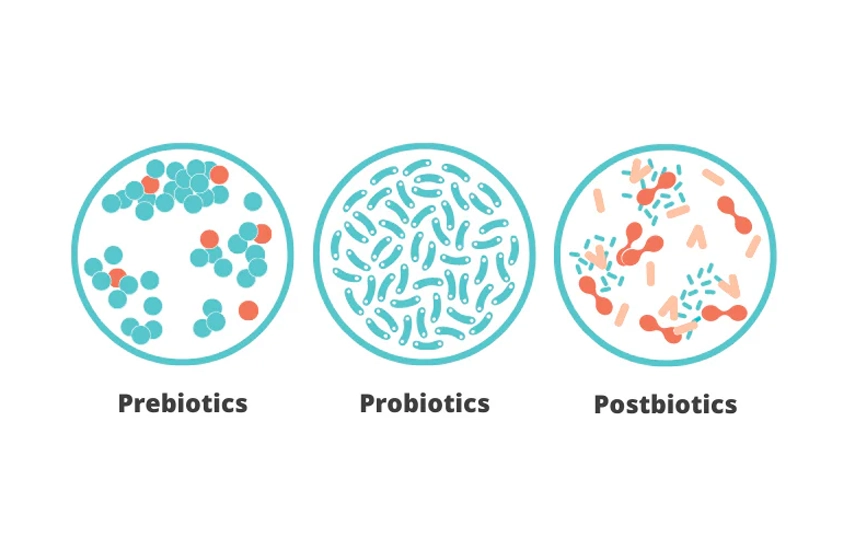We’ve Tested 7 Top-Tier Probiotics: Which One is #1 and How Does It Stack Up Against Other Leading Supplements?

In the past few years, probiotics have literally exploded on the health and wellness scene. But as their popularity rapidly grows, so does the confusion about which supplement to choose. That’s why it’s important to cut through the hype and dig into what truly matters.
We’ve selected seven leading probiotic supplements—Seed, Pendulum, Bioma, Garden of Life, Visbiome, Culturelle, and BioGaia—and analyzed each based on five critical aspects.
In this review, you’ll discover what these critical aspects are, learn the essential qualities of a top-tier probiotic (and the red flags to avoid), uncover some unexpected benefits, and see how Bioma—our #1 pick—stacks up against other probiotic supplements.
Not all probiotic supplements are created equal
Nowadays, a quick Google search for “probiotics” can yield around 178 million results. With new formulations being introduced constantly, there are thousands of supplements available. So, why did we choose these seven particular supplements for this comparison?
That’s because these are all reputable brands with well-established presences and thousands of reviews from their customers. But even more importantly, they are based on rigorous science.
Unlike most probiotics lining store shelves, which have no genuine scientific backing. This is why they often can not deliver on their promises. Meanwhile, the seven supplements we’ve selected can provide benefits beyond just comfortable digestion.
The (un)expected benefits of probiotics
The truth, most people take probiotic supplements to get rid of or at least ease their digestive issues. Such as diarrhea, constipation, bloating, gas, stomach pain, or heartburn.
But a thriving gut can also positively affect many other health aspects. Including the immune system, cognitive function, sleep quality, heart and skin health, longevity, and even aging.
And that’s not all because there’s a reason why people are now looking for “probiotics for weight loss,” “probiotics for menopause weight gain,” and “GLP-1 probiotics.” This brings us to the first aspect we used to compare these seven supplements.
It’s specific strains that extend probiotic benefits
Other probiotics
The key to probiotic benefits lies in the specific strains they contain. And each of these seven supplements offers a unique combination of them. With the number of strains ranging from just one in Culturelle and Pendulum to a diverse array of 24 in Seed. However, while these strains provide benefits beyond digestive health, most are “foreign” to the human gut.
Bioma
Bioma, on the other hand, includes three different Bifidobacteria strains. Which are naturally among the most abundant bacteria in the human gut. Yet, their diversity and quantity rapidly decrease with age and may only make up two percent of the gut microbiome.1
To replenish these depleted bacteria, Bioma is formulated with:
- Bifidobacterium lactis
- Bifidobacterium longum
- Bifidobacterium breve
In addition to promoting digestive health, these probiotic strains are also clinically researched to:
- Speed up metabolism to burn more calories2
- Specifically target visceral (belly) fat3
- Support natural GLP-1 production4
- Promote longevity and healthy aging1
Metabolize estrogen to support its levels during menopause5

The takeaway?
All seven supplements contain probiotic strains that are well-researched to provide more benefits than just digestive health. But what makes Bioma stand out is that it includes three “native” probiotic strains whose levels and diversity in the gut deplete with age.
CFU count: How many billions are actually enough?
Other probiotics
CFU measures the number of viable probiotic organisms in each serving. It ranges from 100 million in Pendulum to 53.6 billion in Seed, and even 112.5 billion in Visbiome. However, higher CFU count doesn’t necessarily mean better results. In fact, taking too many probiotics can actually cause bloating, gas, and nausea, counteracting the intended benefits.
Bioma
Bioma strikes a balance with an effective dose of 9 billion CFU. Which is more than Pendulum (100M) and BioGaia (200M), but less than Garden of Life (50B), Seed (53.6B), and Visbiome (112.25B).
At first glance, it may seem that Bioma is behind these four supplements, which have much higher CFU counts. But that might be only partly true.
It’s because, as we already discussed, too many probiotics may actually cause digestive issues. And as you’ll see next, it doesn’t necessarily mean these high CFU counts will reach your gut.

The takeaway?
While Bioma doesn’t top other supplements by CFU count, its 9 billion CFU dose holds strong. Especially in light of the third critical aspect we’ll discuss next.
Survival is a critical factor for probiotics
Other probiotics
Probiotic strains are living organisms sensitive to heat, oxygen, light, moisture, and, most importantly, stomach acid. However, a 2021 study showed that none of the tested supplements could pass through the digestive tract intact. And of our selected probiotics, only Seed uses a capsule-in-capsule delivery system to address this issue, apart from Bioma.6
Bioma
Bioma employs multiple strategies to keep its probiotic strains viable and effective:
- Delayed-release capsules protect probiotics from harsh stomach acid, dissolving only when they reach the intestines for maximum impact.
- Freeze-drying technology preserves these strains, significantly extending shelf life and maintaining viability without refrigeration.
- Dark glass bottles provide superior protection against light and moisture throughout storage, delivery, and use.

The takeaway?
Probiotics are fragile living organisms, which must be protected from heat, oxygen, light, moisture, and stomach acid. Out of all seven supplements tested, Bioma takes the lead because it implements three advanced strategies for maximum viability and effectiveness.
It’s not just probiotics that matter
Other probiotics
Most supplements on the market today only contain probiotic strains, including BioGaia and Visbiome from our selected supplements. The exceptions are Seed, Culturelle, Garden of Life, and Pendulum, which include prebiotics as well. However, out of all seven supplements we’ve tested, only Bioma has another very important ingredient: postbiotics.
Bioma
To provide the full spectrum of benefits and consistent results, Bioma is formulated with:
- Probiotic Bifidobacteria that support comfortable digestion, regular bowel movements, weight loss, natural GLP-1 production, and even estrogen levels.1,2,3,4,5
- Prebiotic xylooligosaccharides (XOS), which selectively feed Bifidobacteria to increase their quantity in the gut and also directly target belly fat.7,8
Postbiotic Tributyrin, which, in addition to creating a favorable environment for Bifidobacteria in the gut, also speeds up metabolism.9

The takeaway?
BioGaia and Visbiome contain probiotics, while Seed, Culturelle, Garden of Life, and Pendulum include probiotics and prebiotics. But only Bioma has prebiotics, probiotics, and POSTBIOTICS, which not only support the other two ingredients but have their own benefits as well.
Pricing and purchase options
Other probiotics
Price is another essential factor when choosing a probiotic. Among our selected supplements, prices range from $31.27 for Garden of Life to $59.00 for Pendulum and $67.95 for Visbiome. However, some brands have limited purchasing options—Visbiome offers only one-time purchases, while Seed requires a subscription.
Bioma
Bioma, Pendulum, BioGaia, and Culturelle offer the most flexibility, with both one-time purchases and subscriptions available. However, Bioma stood out in two key ways when we compared our selected supplements.
Bioma offers one-time purchases and subscriptions with supply options of one, three, or six months. This makes it easier to stay stocked up without making too big of a commitment.
Also, even though Bioma contains prebiotics, probiotics, and postbiotics, it starts at just $25.99 per month. Therefore, it is more affordable than BioGaia ($28.99), Garden of Life ($31.27), Seed ($49.99), Pendulum ($59.00), Visbiome ($67.95), and slightly more expensive than Culturelle ($17.99).
The takeaway?
Bioma, Pendulum, BioGaia, and Culturelle have the most flexible purchase options. But despite having an advanced and complete formula, Bioma is more affordable than other supplements we’ve tested, except for Culturelle, which contains probiotics only.
Final words and a quick recap of this review
With countless options and new supplements being introduced constantly, it can be really challenging to find the right product. That’s why we’ve selected seven top-tier probiotics for this comparison. Here’s a quick summary of why we chose Bioma as the #1 supplement:
- Probiotic strains that are “native” to the human gut
- Contains an effective CFU count
- Combines probiotics, prebiotics, and postbiotics
- Advanced protection for maximum effectiveness
- Starts at $25.99 with flexible purchase options
In addition, Bioma is manufactured in an FDA-registered and GMP-certified facility. It’s also non-GMO, gluten-free, stimulant-free, keto-friendly, and vegan. Therefore, when we added everything up, Bioma stood out as #1 out of all seven supplements we’ve tested.
| IMPORTANT UPDATE Since this article was published on Health Insider, Bioma has gained tremendous attention and interest. The company has reached out to our editorial team to inform us that, for a limited time, they are offering our readers an exclusive 35% discount on Bioma. Plus, every subscription comes with free shipping and a money-back guarantee. |
Take advantage of this limited-time offer and try Bioma with 35% discount, free shipping, and a money-back guarantee!
Check Availability
Results may vary due to personal features
Sources:
- Gut Bifidobacteria Populations in Human Health and Aging
https://www.frontiersin.org/journals/microbiology/articles/10.3389/fmicb.2016.01204/full
- Effect of Intake of Bifidobacteria and Dietary Fiber on Resting Energy Expenditure: A Randomized, Placebo-Controlled, Double-Blind, Parallel-Group Comparison Study
https://www.mdpi.com/2072-6643/16/14/2345
- Effect of Bifidobacterium animalis ssp. lactis GCL2505 on visceral fat accumulation in healthy Japanese adults: a randomized controlled trial
https://pubmed.ncbi.nlm.nih.gov/27867803/
- Oral Administration of Lactobacillus casei and Bifidobacterium bifidum Improves Glucagon like Peptide-1(GLP-1) and Glucose-Dependent Insulinotropic Polypeptide (GIP) Level in Streptozotocin Induced Diabetic Rats
- The Gut Microbiome and Sex Hormone-Related Diseases
https://www.frontiersin.org/journals/microbiology/articles/10.3389/fmicb.2021.711137/full
- In vitro test to evaluate survival in the gastrointestinal tract of commercial probiotics
https://www.sciencedirect.com/science/article/pii/S2665927121000320
- Xylooligosaccharide increases bifidobacteria but not lactobacilli in human gut microbiota
https://pubmed.ncbi.nlm.nih.gov/24513849/
- Xylooligosaccharide supplementation decreases visceral fat accumulation and modulates cecum microbiome in mice
https://www.sciencedirect.com/science/article/abs/pii/S1756464618305553
- Tributyrin Attenuates Metabolic and Inflammatory Changes Associated with Obesity through a GPR109A-Dependent Mechanism
Related articles





